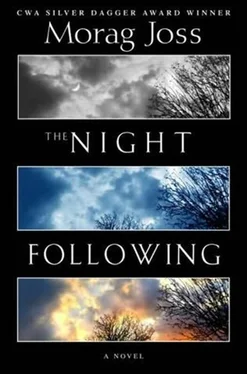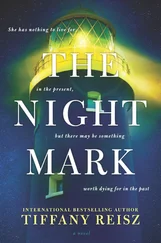A baby out of the blue. A beautiful baby and no father to give her his name, it’s a scandal,” Evelyn said, feeling quite at the end of her tether. “Why didn’t you tell me you were in trouble? Wait till your Uncle Les hears. Or does he know and he didn’t tell me? Maybe everybody on the street knew you were expecting, everybody but me. Why did nobody say?”
“Nobody knew,” Grace said sullenly. “I made sure of that. I didn’t hardly show and I’m always behind the counter anyway. I thought I’d have it without folk knowing and get it adopted.”
“Without folk knowing? How were you going to manage that?”
Grace sighed. “I don’t rightly know,” she said. “I was trying not to think about it. Anyway, folk’ll have to know now, won’t they? Because I’m keeping her. I’m not having her adopted. I’m keeping her and nobody’s going to stop me.”
There was a silence. “Aye, and I won’t try and stop you, lass,” Evelyn said gently. “It’ll be hard going, mind. And I don’t know what your Uncle Les is going to say. I’m warning you he won’t like it. He’s a respected businessman. He’ll get it out of you, who the father is.”
“Oh, never you worry. I can handle him,” Grace said stoutly. “You leave him to me. Nobody is going to stop me keeping my baby.”
Just then there was a soft little mewl and a tiny splutter from the baby. Evelyn wiped her eyes and smiled. “All right, then. We’ll take one day at a time,” she sighed, handing the baby over.“One day at a time.”
Grace was right. She could and did handle Uncle Les. By the evening, after she had spoken to him alone, he was quite reconciled to the child’s existence and, to Evelyn’s further amazement, he accepted that Grace was never going to divulge the father’s name. They discussed the matter in the sun lounge over tea while Grace and the baby were asleep upstairs. Matron had spoken to the owners of the Maud Braddock Home and had softened even further. Grace would stay on for another few days before going back to Aldbury, but for now, she needed rest. It was unheard of, a newborn baby at the Maud Braddock, but now that they were getting used to it the staff were enjoying the novelty and word had gone round among the patients, too. It seemed to be giving everyone a lift.
“But, Uncle Les, the fellow’s got to face his responsibilities, whoever he is. He’s fathered a child,” Evelyn said. “Even if he won’t marry her he has to take responsibility. It’s only right he should provide.”
But Uncle Les was very uncomfortable about pursuing the matter any further. “The child will be provided for, never you mind that. Grace is twenty-three, she’s a grown woman and if she won’t say, she won’t say,” he said with finality. “So we let it drop. You hear me? Bad for the child otherwise. You need to bring her up so it’s natural to her she has her mother’s name and no father. Bring her up believing he’s dead. She won’t know any better. Then she won’t hanker after him.”
“But-” Evelyn had opened her mouth to protest, thinking how she had never stopped missing the father she barely remembered, but Uncle Les silenced her.
“Nay, there’s no more to be said. There’s an end to it. It’s not to be discussed again in my hearing, or in the child’s. Have another scone, they’re homemade.”
Evelyn drank some of her tea thoughtfully. “It’s not just the father’s name,”she said, trying to lighten her voice.“There’s the name of the place an’ all. Have we to put ‘the Maud Braddock Memorial Home for Invalids’ as place of birth on the little mite’s birth certificate? That’ll look peculiar. Whoever heard of a baby getting born in an invalids’ home?”
Uncle Les gave a short laugh. “We won’t need to. It’s not been the Maud Braddock that long. Round here it’s still known by the old name. We’ll put that. The locals call it Overdale.”

Every day brought more interference. I would come down when it got dark to find that more coloured foliage had dropped through the letter box: shiny, grinning advice about hearing aids, time-share apartments, stair lifts, handy “systems” for “maximizing priceless storage space.” The downstairs rooms became ragged and spoiled with torn envelopes, unfinished lists, unsigned forms. I would stumble across the paraphernalia of Arthur’s leg treatments: towels, open tubes of ointment, bandages and socks left where he had pulled them off. The kitchen filled up with the neighbour’s unrecognizable food in plastic containers, with notes attached: HEAT GENTLY, WILL SEPARATE IF BOILED. JUST POP UNDER GRILL TILL BROWNED. Some lumpy homemade biscuits turned up from somewhere along with a brochure about assisted living. Della left a potted plant and more poetry (just the slant of some people’s handwriting can arouse fury). One night, stuck on the fridge door under magnets, I found a drawing in crayon of a lady with a halo and wings riding a bicycle, surrounded by clouds and flowers. Underneath was written “from Amy and all the Watsons (at No. 48).”
In dealing with these and other invasions I was holding back, I now see, not merely a tide of encroachment but also the notion that any such staying action could be only that, and would prove, in the end, unavailing. By definition, after all, the besieged have nothing more to play for than survival, and quite possibly the demands of that particular game, all the plucky, ingenious, and inconclusive stratagems to hold off ultimate depletion, are what distract us from its futility. So our way of living did not seem to me so frail that its final breach was inevitable, and I turned over in my mind, with no particular urgency, only the wisdom or practicality of this or that small refinement for its protection. I wrote a note discouraging circulars and callers and stuck it on the door. I left the neighbour’s food out, untouched, on the front step. I did not consider that perhaps a play for time was all our arrangement was or ever could be; I failed to understand that no matter what I did, by little corrosive steps one person or another would be the first to bring it to an absolute end.
Ignoring every portent, I was attuned only to what seemed significant: the watchful and desirous duet between Arthur and me. After all, it was all we needed, and was surely its own fluent justification- though no justification was owed to anyone-for the simple necessity of two, the impossibility of more than two.
27 Cardigan Avenue
Dear Ruth
The baby, Ruth. The baby in the story. What happens to the baby girl?
It’s nice having you around again. I wouldn’t say I’m relaxed about it, it takes some getting used to. DOES NOT HELP, does it, these fools popping up. I can understand why you make yourself scarce in daytime. Why WE do. I can’t avoid them altogether because of legs. Keeping curtains closed sends out the general message though.
Apart from only being around at night, you haven’t come back in what one might call the standard ways, have you? You’re not what anyone could call your average haunter. You’re not scary or tragic, not even mildly SPOOKY, to use a Della word.
In fact, you don’t seem all that deceased. You’re pretty much as you were. Practical, comfortable, always got something to do. Not saying anything-that’s the only big difference, apart from the fact that I can’t see you, not in the old way.
Though on subject of seeing and not seeing, this story. I’m getting on well with it now. I keep thinking about that baby.
Читать дальше













